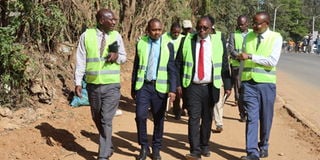Vast Kitui County struggling to repair roads damaged by El Nino rains

Kitui County officials, led by the Executive Committee Member for Roads and Infrastructure Reuben Itiko (left) inspect ongoing road works in the county.
What you need to know:
- Cumulatively Kitui County will repair only 2,800 kilometers out of the 12,000 kilometers, leaving more than 9,000 kilometers unattended.
- The budget allocation for county roads has been a subject of contention between Governor Julius Malombe and the County Assembly.
Kitui County is facing the unique and daunting task of repairing a vast road network damaged by the El Nino rains with a grossly insufficient budget.
The devolved unit has a cumulative network of more than 12,000 kilometres approved in the Kenya Roads Board (KRB) register, the highest in the country.
This figure excludes roads maintained by the national government through the Kenya National Highways Authority (Kenha) and the Kenya Rural Roads Authority (Kerra).

Kitui County Executive Committee Member for Roads and Infrastructure Reuben Itiko (centre), with other County officials, during an inspection of the ongoing road works in the County.
This is because, despite Kitui being the sixth largest county by size with an area of 30,520 square kilometres, every corner is inhabited, meaning the county-classified roads linking up all the villages require maintenance every year.
Most of the top 10 largest counties in Kenya are sparsely populated with a smaller road network, connecting only the inhabited places.
For instance, Marsabit, which is the second largest county after Turkana with a land mass spanning 70,961 square kilometres, has a total road network of about 3,780kms to maintain across the four constituencies of Moyale, North Horr, Saku and Laisamis.
Comparatively, Marsabit has less than a third of what road distances Kitui has to maintain to fully satisfy its infrastructure demands.
According to Kitui County Roads and Public Works Chief Officer Benjamin Chamia, the devolved unit can only afford to repair a paltry 16 per cent of its entire road network.
“In this financial year, we only have Sh441 million budgeted for road maintenance across all the county’s 40 wards, which is just a drop in the ocean,” he said.
This allocation, he added, can only restore less than 20 per cent of the roads damaged by El Nino rains. This means the county has a budget shortfall of 84 per cent every financial year.
To make matters worse, the same allocation is expected to pay pending bills incurred in previous years.

Kitui County officials during an inspection tour of the ongoing road works in the county.
Mr Chamia said the county had requested the national government to provide additional funding and also appealed for support from development partners to bridge the budgetary gaps.
To mitigate the problem, the county has launched a programme where each electoral ward will have 70 kilometres of roads graded between now and June, under the Community Level Infrastructure Development Projects, Mr Chamia told Nation.
"We have devised innovative ways of dealing with the budget constraints mainly by using county-owned heavy machinery to grade roads as opposed to issuing contracts to private merchants," he said.
Each ward development committee, in consultation with their respective Members of the County Assembly, will have to strictly prioritise certain road stretches for grading with the rest left unattended.
This means, cumulatively Kitui County will repair only 2,800 kilometers out of the 12,000 kilometers, leaving more than 9,000 kilometers unattended.
The budget allocation for county roads has been a subject of contention between Governor Julius Malombe and the County Assembly.
Last year, the governor was locked in a budget standoff with MCAs from both the majority and minority parties who boycotted four consecutive sittings protesting reduced development allocations.
Governor Malombe had declined to assent to the Supplementary Appropriation Bill passed by the Assembly on September 27, 2024, citing the reallocation of funds budgeted for roads and payment of pending bills, and referred the Bill back to the Assembly.
The bone of contention was a decision by MCAs to retain Sh284 million meant for road projects in the Supplementary budget, while the Governor wanted the vote reduced by Sh266 million to pay pending bills within the roads department.
This left only Sh18 million to cater for roads construction works, maintenance of box culverts, drifts, gravelling, concrete slabs across the county’s 40 wards.





